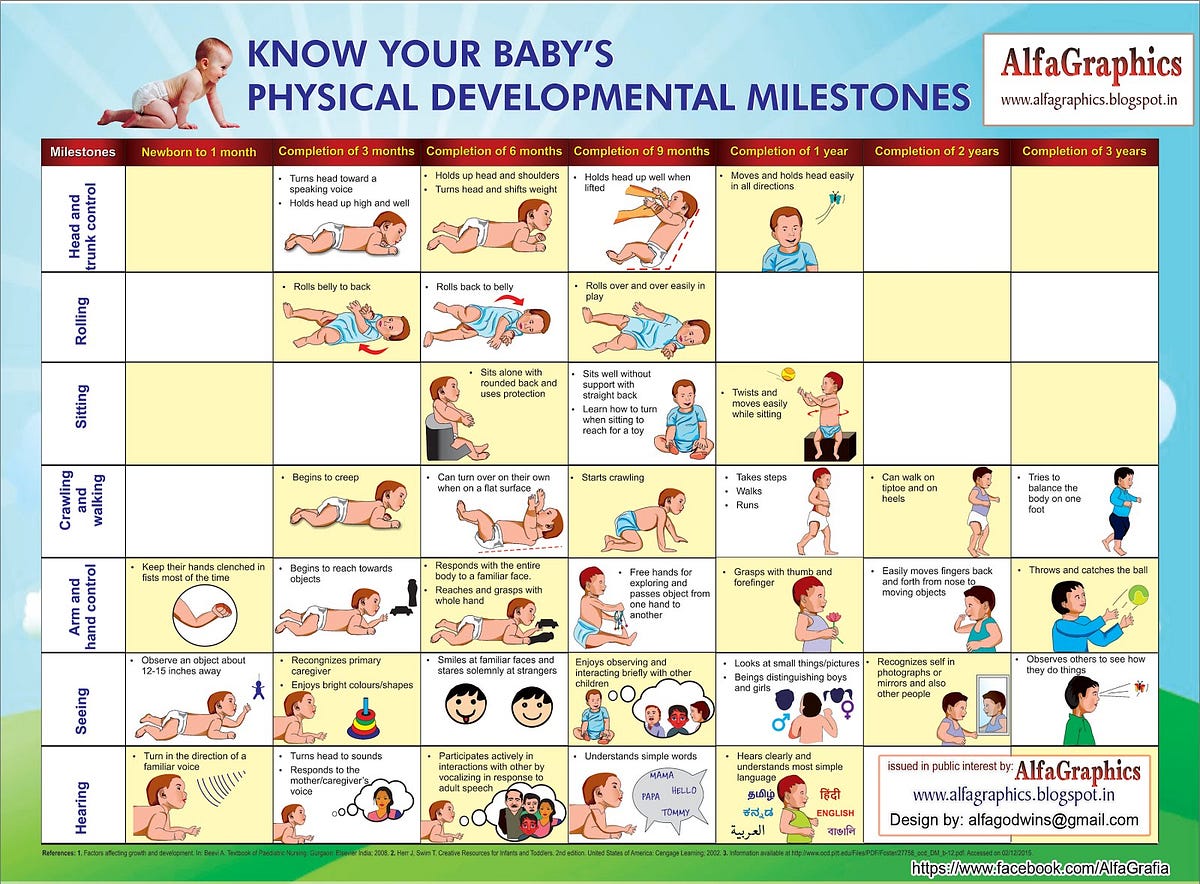 Source: bing.com
Source: bing.comAs a new mom, you are probably wondering what to expect from your little one in terms of developmental milestones. Babies grow and develop at different rates, but there are certain baby landmarks for development that most babies reach around the same time. In this article, we will discuss those landmarks and what you can do to support your baby’s growth and development.
Table of Contents
Physical Development
One of the first things you will notice about your growing baby is their physical development. From the moment they are born, they will be working on their motor skills, which include both gross motor skills (such as rolling over, crawling, and walking) and fine motor skills (such as grasping objects and pointing).
Around 2 months old, your baby will start to lift their head up while lying on their stomach. By 4 months, they will be able to push up with their arms and lift their chest off the ground. Around 6 months, they will start to sit up on their own and reach for objects. By 9 months, they will be crawling and pulling themselves up to stand. And by 12 months, they will likely be taking their first steps!
To support your baby’s physical development, give them plenty of tummy time and playtime on the floor with toys that encourage reaching and grasping. As they grow and start to crawl and walk, provide a safe and stimulating environment for them to explore.
Cognitive Development
In addition to physical development, your baby will also be working on their cognitive skills. Cognitive development refers to the way babies think, learn, and process information.
Around 2 months old, your baby will start to recognize familiar faces and objects. By 6 months, they will be able to understand simple cause-and-effect relationships (such as shaking a rattle and making noise). Around 8-9 months, they will start to develop object permanence, which means they understand that objects still exist even when they are out of sight. And by 12 months, they will be able to imitate gestures and simple actions, understand simple words and commands, and enjoy simple games like peek-a-boo.
To support your baby’s cognitive development, talk to them often, read to them, and engage in interactive play. Provide age-appropriate toys and activities that encourage exploration, problem-solving, and imagination.
Language Development
As your baby’s cognitive skills develop, so will their language skills. Language development refers to the way babies learn to communicate and understand language.
Around 2-3 months old, your baby will start to coo and make vowel sounds. By 6 months, they will start to babble and use consonant sounds. Around 9-10 months, they will start to say their first words (such as “mama” or “dada”) and understand simple words and phrases. And by 12 months, they will have a vocabulary of several words and be able to follow simple directions.
To support your baby’s language development, talk to them often and use a lot of repetition. Read to them and point out objects and pictures in books. Sing songs and play games that involve language, such as “pat-a-cake” or “itsy-bitsy spider.”
Social and Emotional Development
Finally, your baby will also be working on their social and emotional development. This refers to the way babies learn to interact with others and regulate their own emotions.
Around 2 months old, your baby will start to smile socially and respond to your voice and touch. By 6 months, they will start to show stranger anxiety and prefer familiar faces. Around 8-9 months, they will start to show separation anxiety when you leave them with someone else. And by 12 months, they will be able to show affection and will start to understand and follow simple rules and routines.
To support your baby’s social and emotional development, provide plenty of opportunities for social interaction (such as playdates with other babies), respond to their emotional cues, and provide a safe and predictable environment that helps them feel secure.
Conclusion
As you can see, there are many baby landmarks for development that your little one will reach in their first year of life. By understanding what to expect and how to support your baby’s growth and development, you can help them reach their full potential and enjoy this exciting time in their life!
Frequently Asked Questions:
Q: What can I do to support my baby’s physical development?
A: Give them plenty of tummy time and playtime on the floor with toys that encourage reaching and grasping. As they grow and start to crawl and walk, provide a safe and stimulating environment for them to explore.
Q: How can I help my baby develop language skills?
A: Talk to them often and use a lot of repetition. Read to them and point out objects and pictures in books. Sing songs and play games that involve language, such as “pat-a-cake” or “itsy-bitsy spider.”
Q: What are some age-appropriate toys for my baby?
A: Provide toys that encourage exploration, problem-solving, and imagination. Examples include soft blocks, rattles, activity gyms, and toys with buttons, levers, and knobs.
Q: When should I start taking my baby to playdates with other babies?
A: You can start taking your baby to playdates as early as 6-8 weeks old, but be sure to choose playmates who are close to your baby’s age and development level.
Q: What should I do if I am concerned about my baby’s development?
A: Talk to your pediatrician or a developmental specialist. They can assess your baby’s development and provide guidance and resources to support their growth and development.
